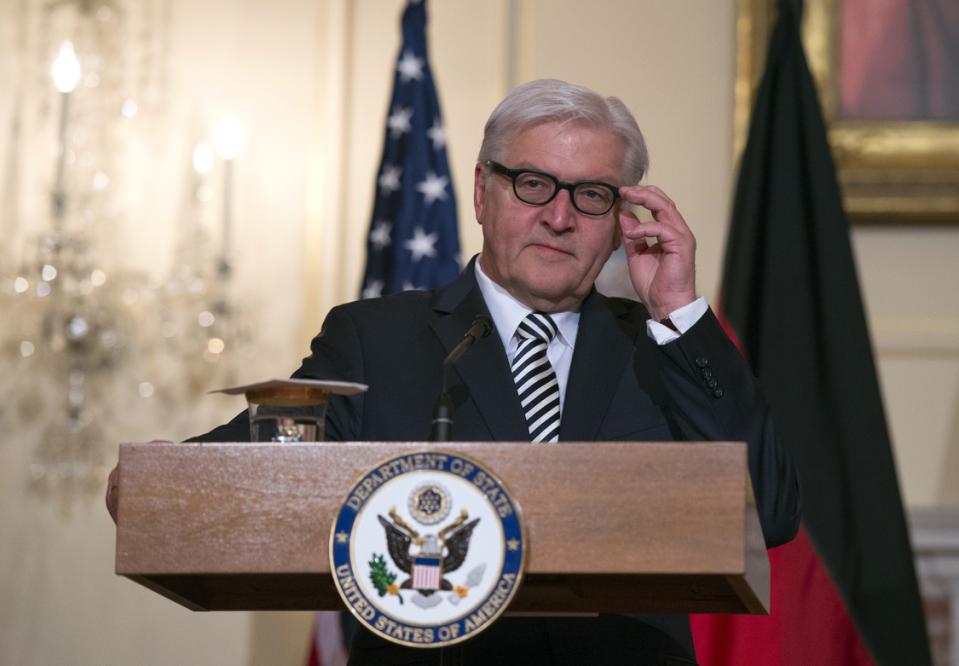[caption id="attachment_155290" align="alignright" width="226"] German Foreign Minister Frank-Walter Steinmeier speaks while meeting with Secretary of State John Kerry at the State Department in Washington, Wednesday, March 11, 2015. (AP Photo/Molly Riley)[/caption]
German Foreign Minister Frank-Walter Steinmeier speaks while meeting with Secretary of State John Kerry at the State Department in Washington, Wednesday, March 11, 2015. (AP Photo/Molly Riley)[/caption]
WASHINGTON (AP) -- European diplomats involved in nuclear negotiations with Iran are expressing unease about an open letter sent this week by Senate Republicans to Iranian leaders, telling them that any deal may not survive beyond the Obama administration.
Echoing criticism of the letter from top Obama administration officials, the diplomats said the letter signed by 47 GOP lawmakers complicates the talks by suggesting that the United States, and, by extension its partners, lack credibility at the negotiation table.
Previously, diplomats said, the negotiations had proceeded from a position that the West had more credibility than Iran on the nuclear issue. While the U.S. and Europe remain convinced that is the case, the letter gives Iran the opportunity to challenge that, they said.
On a visit to Washington on Thursday, German Foreign Minister Frank-Walter Steinmeier said the letter was "not very helpful" to the negotiations, which he described as being in a "delicate phase" with an end-of-March target date approaching for agreement on a framework accord and a June 30 deadline for a final deal.
Germany, along with the United States and the other four permanent members of the U.N. Security Council - Britain, China, France and Russia, is among the countries attempting to negotiate a deal with Iran. The talks are to resume next week in Lausanne, Switzerland.
In Paris, a senior French diplomat said the letter made it hard on the American negotiators, who have been leading the talks with Iran on behalf of the rest of the group. The diplomat was not authorized to talk about the negotiations publicly and spoke on condition of anonymity.
In London, a spokesman for the Foreign Office urged interested parties not to interfere in the negotiations as numerous complex issues remain unresolved. He urged observers to let negotiators work until the June 30 deadline without any actions that could undermine the negotiations. He spoke on condition of anonymity because, in accordance with custom, he was not authorized to discuss the issue for attribution.
The letter, written by freshman Sen. Tom Cotton of Arkansas was signed by 46 of his Senate colleagues, including three potential 2016 presidential candidates, and belatedly by a fourth, Louisiana Gov. Bobby Jindal. Styled as a U.S. civics lesson, the letter noted that any deal struck is nonbinding and whoever is elected to succeed President Barack Obama could nullify it.
Earlier Thursday, Iran's supreme leader, Ayatollah Ali Khamenei, called the letter a sign of "the collapse of political ethics and the U.S. system's internal disintegration," according to the official IRNA news agency. It was the first reaction to the letter by Khamenei, who has the final say over all major policies. His representative at the talks, Foreign Minister Mohammad Javad Zarif, had already dismissed the letter as a propaganda ploy.
Steinmeier met Wednesday with Secretary of State John Kerry. Kerry denounced the letter in testimony before the Senate Foreign Relations Committee as an attempt to sabotage the talks and said he reacted with "utter disbelief" that senators would try to undermine the talks.
By The Associated Press

 QR code
QR code